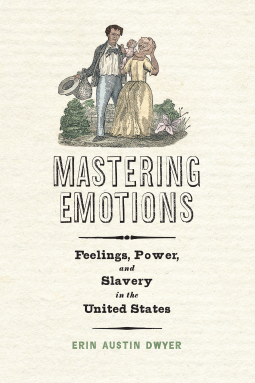
Mastering Emotions
Feelings, Power, and Slavery in the United States
by Erin Austin Dwyer
This title was previously available on NetGalley and is now archived.
Send NetGalley books directly to your Kindle or Kindle app
1
To read on a Kindle or Kindle app, please add kindle@netgalley.com as an approved email address to receive files in your Amazon account. Click here for step-by-step instructions.
2
Also find your Kindle email address within your Amazon account, and enter it here.
Pub Date Nov 16 2021 | Archive Date Oct 22 2021
Talking about this book? Use #MasteringEmotions #NetGalley. More hashtag tips!
Description
Emotions were central to the ways that slaveholders perpetuated slavery, as well as to the ways that enslaved people survived and challenged bondage and experienced freedom. Mastering Emotions examines the interactions between slaveholders and enslaved people, and between White people and free Black people, to expose how emotions such as love, terror, happiness, and trust functioned as social and economic capital for slaveholders and enslaved people alike.
The daily interactions that occurred between slaveholders and enslaved people around emotions, in conjunction with larger debates about race and freedom, form the backbone of what Erin Austin Dwyer calls the emotional politics of slavery. Race and status determined which emotions were permissible or punishable, which should be restrained, and by whom. As a result, mastering emotions, one's ability to control one's own feelings and those of others, was paramount for slaveholders and enslaved. The emotional politics of slavery were thus fashioned by enslaved people and slaveholders together through the crucible of slavery.
Emancipation was a seismic shift in the affective landscape of the antebellum South. Though the end of the Civil War rendered moot the debate over how to emotionally maintain slavery, the lingering conflict over whether the emotional strictures governing the South would be based on race or free status had serious repercussions, particularly for free Black people. The postwar rise of legal and extralegal attempts to affectively control free Black people underscored the commitment of elite White Southerners to preserving the power dynamics of the emotional politics of slavery, by any means necessary. Mastering Emotions concludes by detailing how the long-term legacy of those emotional politics reverberated through Reconstruction and the Jim Crow eras.
Advance Praise
"Anyone who has ever felt compelled to force a tight smile, cast down your gaze, or make yourself small in the presence of authority needs to read this book. Such tactics, survival skills for navigating emotional power dynamics, have been fundamental to America's tragic history of race and human bondage. With passionate prose and deep insight, Dwyer shows how within antebellum slave society, feelings were not merely expressions of people's inner selves, they were also tools, weapons, and shields in life and death conflicts. And she makes it bracingly clear that in many of our affective norms and strategic performances of emotion, 'the sentiment left by slavery is still with us.'"
—Vincent Brown, author of Tacky's Revolt: The Story of an Atlantic Slave War
"How did emotions—those of the enslaved and enslavers—shape the contours of slavery in the United States? Mastering Emotions is a rich, and much-needed, answer to that question, adding an important dimension to the study of an institution whose legacies still resonate."
—Annette Gordon-Reed, author of The Hemingses of Monticello: An American Family
Available Editions
| EDITION | Other Format |
| ISBN | 9780812253399 |
| PRICE | $39.95 (USD) |
Average rating from 12 members
Featured Reviews
This book contributed to a deeper understanding of enslavement than any book I can think of. It's a profoundly personal book that hooked me on an intimate level; I didn't think that I would say that before reading, but this really is a great work of history that helps us to understand exactly how people on both sides of institution felt at the time, and how those feelings led to action.
I say personal because you can't discuss emotions without thinking about the person, this is great history that is neither grand narrative nor case study. It is not psycho-history, either. I say intimate because it helps us connect to the individuals, their choices, their sufferings a bit more than we have before this history. We can never fully understand what it was like to be an enslaved person, yet this work helps the reader build historical empathy maybe more than any other book I have read. To truly understand and appreciate history, it's my personal view that empathy is the key. Dwyer does such a great job helping the reader to navigate just exactly what would have been going on in the minds of the time, and we come to realize that although circumstances are different, we all understand joy, pain, suffering, fear, anxiety, happiness. Those are the best connections we have to the past.
I look forward to pulling in this research into my classes as I discuss the lives of enslaved people and the issue of the institution itself- without a doubt, my students will be able to understand it on a deeper level because as humans, our shared emotions transcend time periods.
 Rebecca T, Educator
Rebecca T, Educator
19th-century US slavery with a focus on emotional meanings: ways in which enslaved people were punished for having negative emotions and slavery was justified by claiming that Black people didn’t feel pain the same way white people did; ways in which enslavers were supposed to be in control and ways in which they used their emotions to dominate, or attempted to dominate; etc. Because emotion is so central to all human behavior, this is another lens rather than an account that really introduces new material.
HomeComics & NovelsBook ReviewsNon-Fiction Reviews“Mastering Emotions” Is Powerful and Necessary
“Mastering Emotions” Is Powerful and NecessaryBook Reviews Non-Fiction Reviews The Prince of Unpopular Opinions August 3, 2021 Amanda
FacebookTwitterPinterestWhatsAppShare
It’s a brilliant coincidence that this was the year I began watching the new Crash Course on Black American History that the book Mastering Emotions: Feelings, Power, and Slavery in the United States by Erin Austin Dwyer came onto my radar.
I’m gonna level with y’all, this should be mandatory reading. I’m not going to say it’s easy mandatory reading but it’s mandatory reading. I don’t make the rules, I just enforce them. This book is masterful at tearing down the myth that slavery was good for black people and going over the lies, gaslighting, tools and many manipulations white slaveowners and those who sympathized with them and pushed forward their racist agenda used to continue to hold dominion over an entire race of people for the sake of economic gain.
I had a really hard time reading this as a black person but it was so enlightening and so important. Coming from a black family, we always talked about this stuff but lacked a lot of the academic language to put those feelings into my eloquent words and it’s always been difficult to explain to non-black people that slavery was not only bad but an emotional scar that continues to cling to black Americans even today in the form of continued value, generational trauma and perpetuated unhealthy myths about the practice.
These feelings of inadequacy and being lesser have affected every single part of my life, even my fandom experiences from dealing with racist trolls at panels, being talked over during conventions and the increased sexual harassment and assault women of color receive and it’s all rooted to the tactics and terrors used in the early history of owning slaves in the US.
Mastering Emotions is timely, thought-provoking and powerful. I highly recommend it.
Mastering Emotions: Feelings, Power, and Slavery in the United States by Erin Austin Dwyer comes out October 22, 2021
 Reviewer 101675
Reviewer 101675
This was a fascinating book about the world of emotions during slavery. It covers both the experience of slave owners and that of the slaves themselves. The author's careful, diligent, and thoughtful research is evident.
 Anita S, Librarian
Anita S, Librarian
The introduction of this essential and critical work begins with a discussion of Charles Ball, an enslaved man in the antebellum South, writing primarily for White, Northern, abolitionist readers. He mentioned in his writings that enslaved people were often afraid to divulge how something made them feel because they must never "manifest feelings of resentment" and were expected to feign more marketable emotions like "humility."
This book argues that enslaved people knew that they would need to, like a reflex, develop a trained reaction so that whenever they were questioned about how their experience as an enslaved person made them feel, that they didn't express their true sentiments for fear of retaliation or perhaps even re-enslavement once free.
Further, this book also argues that the writings of enslaved people and slaveholders, as well as those of proslavery authors and abolitionists, "demonstrate that in the antebellum South feelings were a currency of power in master-slave relationships." There is an emotional undercurrent to the politics of slavery that many modern-day readers may not realize. "Though slavery is a subject wrought with emotion, historians of emotion have neglected antebellum American slavery and racial politics more generally." This book addresses that particular gap in this area of scholarship surrounding transatlantic slavery and enhances the reader's understanding of the crucial role emotions played during this era from a multiplicity of perspectives.
Another topic of discussion is the relationship slave mistresses had with protecting their reputations and performing relationships with enslaved people to some extent, giving the example of Harriet Jacobs, who wrote "Incidents in the Life of a Slave Girl," who recalled that white women would stop by her grandmother's to "bring her some little comforts" when she became sick of many of the local elite.
Any book that discusses this topic must, of course, explore one of the most primal emotions in this area, that of fear--both the fears that enslaved people had toward white planters and other white people in positions of authority, but also the fears that the white planters had of uprisings of enslaved people, particularly with stories of Denmark Vesey, Nat Turner, and the Haitian Revolution. Interestingly, the author brings up the fact that enslaved people were very familiar with what their owners feared, and that in some cases, they deliberately wanted to invoke white fear or "White terror" as a means of antislavery resistance.
The book discusses both adults as well as children, and the definitions of who is defined as a "child" and with what lens. Childhood itself, after all, is a modern concept "that is socially, culturally, and temporally constructed as well as heavily contingent on race, class, and gender," as the author asserts. Further, childhood in the antebellum South not only looked different from childhood in the South today, "but also varied wildly for the enslaved and free children living under slavery."
From Frederick Douglass to Solomon Northup, this book dissects several different cases of the spectrum of emotions related to transatlantic slavery. It also takes time to dissect the formulas and genre roles involved in slave narratives and how these principles were kept in mind for the target reading audiences for these texts. It sheds very significant light on a well-trodden area of scholarship, and should definitely be on the 'to read' pile of anyone who is interested in the subject, particularly the history of race relations in the 1800s in the American Southern states.
 Reviewer 762493
Reviewer 762493
"Mastering Emotions" helped me understand slavery in America better than before; and better than I was expecting. By focusing on emotions and the inner lives of both slaveholders and enslaved people, it's created both a vivid picture of the past, and a solid basis for understanding post-slavery developments.
<b>Dwyer's history and analysis have the interesting quality of being both revealing and, in hindsight, fairly obvious.</b>
The obviousness comes in the form of everything making sense, even if I'd never stopped to consider the topics before. It makes sense that White slaveowners should have a deeply paradoxical understanding of Black slaves: perceived as both loyal and a potential threat, both unable to feel deep emotions and capable of keenly feeling emotional punishment, both content in slavery and likely to turn vengeful once free. It also makes sense that Black enslaved people should hide their true emotions and pretend loyalty and contentment to avoid punishment and possibly make a better life for themselves.
These make sense because they reflect deeply human tendencies: we already know that there are those who fervently believe something because it's convenient to them. We know they will take every opportunity to persuade themselves that they're doing the right thing. We know they'll change their minds according to what they want to achieve and not be aware while doing it. It's also clear that hose who find themselves constrained by circumstances and threatened with abuse will learn to project the right impressions outwardly.
Where Dwyer's work shines is in details of interactions. While the lens of the researcher inevitably dehumanizes occasionally by explaining from a distance (as all research does), there's a lot to be said about portraying the way Whites and Blacks interacted, and especially how their reactions to one another created a loop. Black people would pretend to be content and loyal to avoid punishment, which White people would (somewhat) take for loyalty and contentment, which they would then use to justify slavery and emotional policing (as they're looking out for the welfare of Blacks, who are loyal and content), which would lead to Black people needing to play the part even more and so on.
An interesting part of the book also concerned post-Emancipation reactions, from panicked former slaveowners to the exuberance of Black people who found themselves free, and the attempt to reinstate emotional policing over Blacks by demanding they act as they had during slavery: content with their lot, respectul to their "betters", cheerful without being familiar.
I was struck not so much by the resemblance to emotional impositions on Black people in the US today (which I know too little about; it's for other to discuss), but by the things I've heard from American service industry workers, such as maintaining a cheerful face, being deferent to customers even when customers are disrespectful, and more. As a European, I expect waiters in restaurants to not be rude, but "not rude" is about it. I'm not sure if there's emotional policing still enforced today on more than a racial level or if I'm reading too much into this, but it's food for thought, I suppose.
Overall, "Mastering Emotions" is a great overview of the emotional landscape of the US South before the Civil War (1861-865) - and while it goes into some detail, I feel there are more topics which can be explored starting from here; I consider this to be a plus to everything mentioned above. Another nice plus is that even if readers are probably assumed to be familiar with US history, there were very few things I felt the need to look up to understand the text better (e.g., how an enslaved person could earn money).
<i>Many thanks to NetGalley and University of Pennsylvania Press for providing a free ARC in exchange for an honest review.</i>
This was a well written book and looked at emotions and responses from a perspective that is not the norm. It is a heavy read and not necessarily one I would read for pleasure, but it is worth reading to see how our culture has been shaped and the structures that keep people “in place”, even when those structures are tired and do not serve society in a way that is beneficial. If for nothing else, read it to see the world from someone else’s eyes.
I received an ARC courtesy of NetGalley and the publisher. The opinions are my own.
In Mastering Emotions, Dwyer takes on a very compelling and interesting topic, consider the inner emotional lives of both slaveholders and the enslaved. Positioning this book as one that looks at how both groups manuipulate emotions for their benefit, Dwyer takes an equality of perspective that seems apt for a historian but is also uncomfortable to read. I don’t mean in the “this is difficult history” way, but rather, there’s posturing in her language for the potential white audience of this book. It comes down to even the very of what slaveholders “could have done” when there is clear evidence many did—so why say could instead of did? There’s a lot of important conversation in this text, particularly about how these emotional tactics create lasting patterns of trauma that still affect today, and that makes the book worth the read.
Dwyer is doing such important work with this book. The history of emotions and love is often dominated by the stories of white individuals. By providing the emotion history to slavery, Dwyer provides an interesting and much needed perspective to the field. Perhaps most important is the way Dwyer explains the currency of emotion. Also moving was the clear displays the hoops enslavers went through to emotionally justify enslavement.
Mastering Emotions is a fantastic introduction to both the history of slavery and the history of emotions. I would absolutely assign it to my undergrads and highly recommend it to anyone who wants to get started in wither topics. It is full of fantastic sources and yet very accessible to those who are not academics.
Readers who liked this book also liked:
Peter J. Verovšek
Biographies & Memoirs, Nonfiction (Adult), Politics & Current Affairs


















